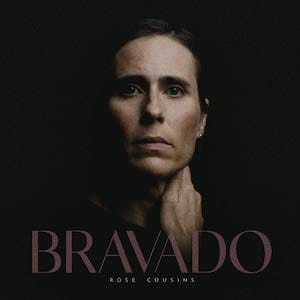 Rose Cousins – Bravado
Rose Cousins – Bravado
Outside Music – 21 February 2020
An award-winning and Grammy-nominated singer-songwriter based out of Halifax, Rose Cousins’s fifth studio album sees her step into the producer’s chair. Bravado is a collection of songs that she describes as being both “those who struggle with loneliness and those wishing they had more time alone” and about the disconnect between the version of ourselves we present to the world and the version of who we are inside, those who seek change but are terrified of it.
As such, the stabbing piano, poppy opener (think Billy Joel meets Sheryl Crow) is titled The Benefits Of Being Alone, a bittersweet song about doing what you like without having to consider someone else’s schedule or needs, going where you like when you want to, but it’s hard not to hear an edge when she sings how it makes for good song (“that’s what makes the show”) and that she’s “The only one who’s there when I get home”.
Tellingly, the song is revisited as the penultimate track, The Reprise, only this time as a slow, reflective piano ballad where the mood and tempo inevitably prompt a reassessment of the emotional framework.
Returning to the start, the mid-tempo, vocally soaring The Expert yields the album title as she sings of “me and my bravado”, again speaking of a swagger and confidence, of not looking around to see greener grasses, but somehow still hinting at possibly shaky foundations, bravado, of course, being about putting on a show to impress or persuade others.
She reins things in for the more sparely arranged slow waltzing The Agreement, in which the narrator talks of spending the night in beautiful sin with a lover, but adds how she had no romantic delusions “I know I’m not just any, but I know that I’m one of many”. On the surface, it speaks of acceptance of how things are, but it’s tellingly followed by The Fraud, a piano ballad with a vintage Brill Building ambience that again juggles ambiguous feeling about emotional attachments, one the one hand asking “Tell me how do you make it look simple?/Falling down deep into love/It takes all that I have just to stand here/And more not to run”, and declaring that “Nothing I’ve learned about love in the past/Could convince me to stick around”, and on the other wondering “How will I know/When to let go?/How will I see/When somebody loves me?”, intercut with the chorus of “Don’t leave me” and concluding “Happiest when I’m alone/And it may be that it’s all that I need/It could be that’s all I know”.
From this point on, save for the 37-second Din (which isn’t), all titles come with parentheses, first being the piano-accompanied The Time Being (Impending Mortality Awareness Society) with its echoes of Dory Previn and a carpe diem message, followed by the gathering, uplifting sway of The Return (Love Comes Back) which, joined by a choir of friends as it reaches a climax, has her singing “when the storm is through/New words will find you/And what those words will say/”You’re going to be okay”.”
Things ebb and flow musically again with the piano, double bass and shimmering cymbals of the moodily atmospheric flow between the hush and turbulence of The Swimmer (To Be An Old Man). It’s followed, in turn, by the deep piano notes of The Lullaby (My Oldest Love), a hymnal quality song co-penned with Tim Baker that touches on the desperate need for affirmation, and then, the yearning for acceptance (“call me by my name and I will answer.., I want to be a good woman”) that is the full-bodied waltz-time piano arrangement of The Benediction (A Good Woman).
It closes with The Truth (It’s Just Emotion), opening distantly and gradually building to a cacophonous tumult before fading way again at the end like some sonic metaphor, a defiant finale on an album that echoes Peggy Lee in asking “is that all there is” and finds that being alone and allowing ourselves to be vulnerable can be an act of courage and not submission, just as reaching out is a sign of strength, not weakness. Cousins has reached within and emerged with an album that fully rewards on both a musical and emotional level. There’s no false bravado here.
